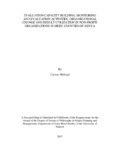| dc.description.abstract | This study aimed at establishing the influence of Evaluation Capacity Building (ECB)
activities on M&E result utilization and the moderating role of M&E practice on the
relationship between ECB activities and M&E result utilization. It also sought to
determine the mediating influence of Organizational Evaluational Change (OEC) on
relationship between ECB and M&E practice. This was done at a time when there is
an increasing demand of credible and usable information through M&E processes
throughout the world. ECB activities considered were; professional development,
resource allocation, M&E support structures, and activities that help build
evaluational environment. A review of literature was done and it was established that
although there are numerous studies on the role of ECB in promoting M&E process
but there are few empirical studies conducted showing the relationship between ECB
activities and M&E results utilization. Hypotheses were formulated to help test the
relationship between ECB activities and M&E results utilization. The study was
guided by pragmatism paradigm. A descriptive survey design was used in the study.
Using stratified random sampling the study obtained a sample of 218 from a
population of 504. A structured questionnaire with Likert-type interval scale anchored
on a five-point scale was used to collect primary data. An interview guide and
document review techniques were used to triangulate the results. Tess for statistical
assumptions showed that normality was not perfect but reflected a near normal
distribution with linearity of the variables confirmed. The tests also confirmed that the
variables had no multicollinearity. Pearson’s Product Moment Correlation was used to
test the direction and relationships between the variables and this showed that all ECB
variables had influence on M&E result utilization. Regressions analysis indicated that
the strengths of these relationships were significant at .05 significant level and using
F-tests, the hypothesis of the study were tested it was established that ECB activities
of professional development, resource allocation, M&E support structure and
activities that help create evaluational environment separately and jointly have
influence on M&E result utilization. It was also established that M&E activities have
a moderating role on the relationship between ECB activities and M&E results
utilization. However, study established that the influence of ECB activities on M&E
result utilization by employees is not necessarily mediated by organizational
evaluation change. The study recommends that organizations should invest in ECB
activities in a more systematic way to build capacity in M&E in an effort to improve
M&E result utilization. Project organizations should also pay attention to evaluational
needs of its employees so that they could plan a comprehensive evaluational capacity
building plan. Project employees should also be sensitized to change their view of
M&E as an accountability tool and embrace the right evaluational philosophies so as
not to lose M&E aspect of knowledge generation. There is need to carry out a study to
establish factors that have influenced a high level of M&E results utilization in the
counties of Meru and Tharaka Nithi. The study also recommend establishment of a
ECB model that would be used in a simple way to build M&E capacities in a
systematic manner in the region. | en_US |

